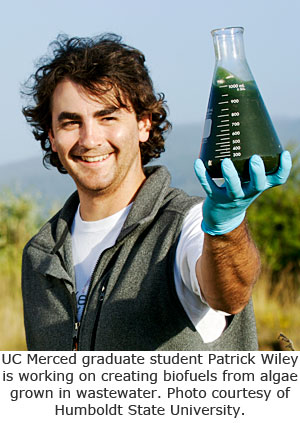

Patrick Wiley has made a living treating wastewater. Now he’s trying to make a difference.
Wiley, a 31-year-old
environmental systemsgraduate student at UC Merced, has shifted his focus from the wastewater itself to what can be done with it — or in this case, grown in it — to help the environment. Wiley is working on finding better, more efficient ways to grow and harvest algae in wastewater, algae that can then be used to create biofuel.
Algae grow naturally in wastewater, and the carbon dioxide captured by the algae during photosynthesis can be harvested for use in biofuels. While algae-based fuel might not emit less carbon dioxide into the atmosphere than petroleum fuels, those emissions are offset because the carbon dioxide was initially taken from the atmosphere by way of the algae.
Of all the different types of naturally grown products being explored for use as renewable fuel sources, there are a few particular benefits to algae.
“Algae grow a lot faster than land crops,” Wiley said. “And you can harvest them almost continually, as opposed to corn or something like that. And there’s the issue of land use.”
Wiley’s route to the study of renewable fuel sources at UC Merced was hardly a direct one. He grew up in Maine and enrolled in a one-year wastewater program at a technical college there. He got a job in the field almost immediately, worked for a year, and then went back to school and earned his bachelor’s degree from the University of Maine.
After graduating, he did wastewater treatment work for various cities in Maine before deciding to go back to school again. He had started to become interested in energy efficient wastewater treatment processes, so he traveled across the country to pursue a master’s degree in wastewater utilization at Humboldt State. It was there that Wiley started working toward finding more efficient ways to harvest algae.
After obtaining his master’s, Wiley began searching for ways to continue his education and his work on harvesting algae for biofuel production. He discovered UC Merced Professor
Elliott Campbell, and Wiley and Campbell hit it off almost immediately. The two had a lot in common, from their research interests to their age.
“We had almost the exact same interests in biofuels,” Wiley said. “We just really clicked. It was great.
“I love having Elliott as an adviser. It’s really great to have someone who’s such a nice person and an encouraging mentor.”
Wiley will be busy this summer with two projects related to his research. He will work in Santa Cruz with a biofuels group from the NASA Ames Research Center in Moffett Field, trying to cultivate and harvest thick algae in semi-permeable bags that float in the ocean.
He’ll also work with a UC Berkeley group on an “appropriate technology” use of wastewater, collecting algae from the treatment process and using it to generate electrical power and for use in indoor cooking and heating. This could improve living conditions in rural areas, where people commonly breathe unhealthy air in their homes because of their use of indoor wood stoves. Wiley was the co-director of Humboldt State’s Campus Center for Appropriate Technology, focusing on implementing technology in ways that mesh with general environmental concerns as well as specific limitations in developing countries.






